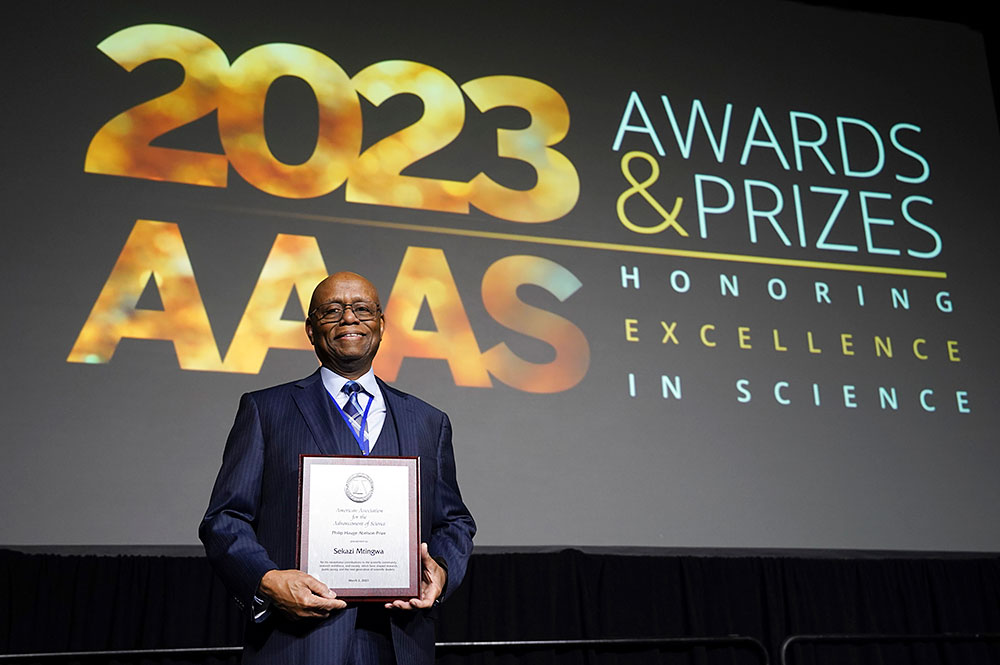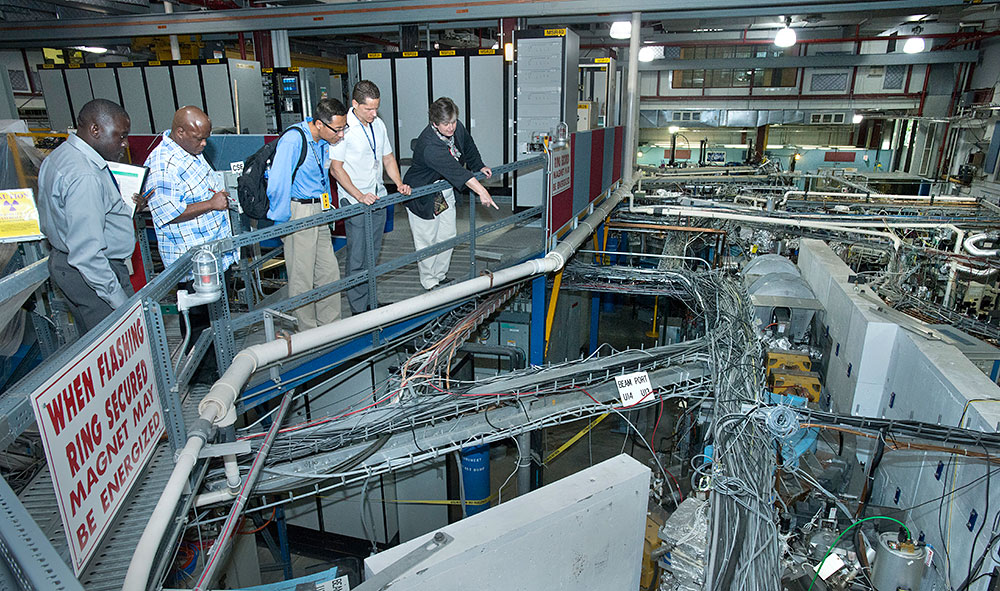Sekazi K. Mtingwa Honored with AAAS Philip Hauge Abelson Prize at Annual Meeting
April 4, 2023
 enlarge
enlarge
Sekazi Mtingwa accepting the Philip Hauge Abelson Prize at the AAAS March Meeting in Washington, D.C. (Courtesy of Robb Cohen Photography and Video)
The American Association for the Advancement of Science (AAAS) has recognized physicist and humanitarian Sekazi Mtingwa for his invaluable work in the field of intrabeam scattering and particle accelerator research as well as his tireless efforts to promote accessibility, diversity, and equity in STEM. Mtingwa’s career and achievements exemplified the theme of this year’s meeting—“Science for Humanity.” Mtingwa has worked for many years in close collaboration with the U.S. Department of Energy’s Brookhaven National Laboratory and other science organizations around the world.
According to the award citation from AAAS, “Dr. Mtingwa was selected to receive this award for how his contributions to the scientific community, research workforce, and society have shaped research, public policy, and the next generation of scientific leaders.”
In Mtingwa’s eyes, this award isn’t an endpoint in his career, but an opportunity to take it even further—a beacon to attract more attention to the organizations he is invested in and the work that they are doing.
“I gravitate towards working in the trenches,” said Mtingwa. “I’ve had administrative roles, but I have also done a lot of hands-on work. When you’re engaged in that work, it’s a lot harder to get your name out there. This is one of the most important aspects of this award. It provides more public exposure to build more connections with institutions and administrators that want to take action.”
“Working in the trenches” doesn’t even begin to sum up the monumental amount of time and effort that has gone into everything Mtingwa has built and he shows no signs of stopping or slowing down. He has helped lead and shape over 18 organizations and initiatives around the world that champion accessibility, diversity, and equity in the scientific community. These organizations serve a variety of needs in the scientific community, both nationally and internationally. They help ensure opportunities and scientific equipment are accessible to underserved communities, like the work being done at the African Laser Centre and Lightsources for Africa, the Americas, Asia, Middle East and Pacific (LAAAMP). They are championing underrepresented groups, academic institutions, and even languages like the newly formed new Union of Physicists from Portuguese Speaking Countries in Africa and the Interdisciplinary Consortium for Research and Educational Access in Science and Engineering (InCREASE).
“InCREASE was founded at Brookhaven Lab, and is still very much rooted there,” explained Mtingwa. “It’s an interdisciplinary consortium for research and educational access in science and engineering. This organization connects faculty and students from minority serving institutions to user facilities at national laboratories and academic institutions. Organizations like this are all about providing resources, because the talent is there.”
In 2011, U.S. Department of Energy’s Brookhaven National Laboratory signed a Memorandum of Understanding (MoU) with InCREASE, where Mtingwa carries out the duties of President. The consortium has held several workshops at national laboratories, ushered in hundreds of faculty and student users of facilities like National Synchrotron Light Source II (NSLS-II) and the Center for Functional Nanomaterials (CFN), and stepped in to help when a devastating hurricane threatened research at the University of Puerto Rico.
Helping to found and build these organizations is only half of the equation though. Mtingwa is only one person, and time is a very limited resource. A big part of having such a tremendous impact is finding others with the same passion and drive to take the reins to free up resources for the next project.
“We started the National Society of Black Physicists in 1977 in a meeting at Morgan State University,” recalled Mtingwa. “At that time, we had about 10 people involved, and it has grown exponentially since then. It’s great to see these organizations thrive. It’s a good feeling to step back and see these endeavors continue to grow and make an impact over time with new people taking the lead and continuing that vision.”
Mtingwa’s drive for growing and bettering the STEM community started with his own excitement for and dedication to science. He received undergraduate degrees in both physics and math at Massachusetts Institute of Technology (MIT) before earning his master’s degree and PhD in theoretical high-energy physics at Princeton University.
In 1981, after a one-year postdoctoral fellowship at Fermilab, Mtingwa and fellow physicist James Bjorken developed the Bjorken–Mtingwa formulation, a solution to calculating the effects of intrabeam scattering, an effect of particle collisions that scatters charged particles in multiple directions, causing the beam of a particle accelerator to grow and the brightness to weaken. Understanding this effect is key to building more efficient particle accelerators. In 1991 at Argonne National Laboratory, Mtingwa provided theoretical proof for plasma wakefield acceleration, a particle acceleration technique that shows promise in making accelerators more compact.
Mtingwa has since held research positions in national laboratories and faculty and administrative positions in academic institutions, giving him a wide glimpse into the scientific landscape and what it needs to push equity further.
“I remember listening to Sekazi speak about his process, which built on three distinct phases,” recalled Noel Blackburn, Brookhaven Lab’s chief diversity officer and national laboratory representative for InCREASE. “He started with his own education and career, because you need to develop yourself before giving back. After establishing himself, he started helping others more locally and nationally. Once he gathered the experience and resources, he expanded that out internationally. I have adopted this structure from him in my own work. He is, truly, an inspirational scientist, philanthropist, and human being.”
Brookhaven National Laboratory is supported by the Office of Science of the U.S. Department of Energy. The Office of Science is the single largest supporter of basic research in the physical sciences in the United States and is working to address some of the most pressing challenges of our time. For more information, visit science.energy.gov.
Follow @BrookhavenLab on Twitter or find us on Facebook.
2023-21137 | INT/EXT | Newsroom










